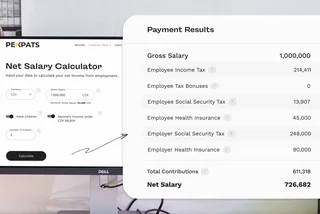The Czech Republic may have been ranked the world’s second-best country for expats to work in but as great as it might be for career development, there are several aspects of the Czech workplace that every woman should be aware of.
The gender pay gap is pronounced
Women in the Czech Republic have been earning remarkably less than their male counterparts. On average women in the country earn a fifth less than men, losing one month's earnings due to the gender pay gap. This disparity is among the widest in the European Union.
Among some of the reasons driving the large pay gap are lengthy maternity leaves, the entrenchment of traditional gender roles, as well as stereotypes and prejudices at the workplace and beyond.
Meanwhile, empowering women in the workplace could unlock as much as €146 billion annually in GDP for the CEE region, says a study on the potential of a gender-balanced society across Central and Eastern European countries.
Despite the promising potential of addressing gender disparity, the wage gap in the Czech Republic is still significant in specific groups of women: biggest among the age group 30-45, for university graduates and in top management.
The good news: Among some of the solutions to the gender pay gap is wage transparency. "Transparency is a set of rules and tools for everyone to know what the pay range is for specific roles," says Lenka Simerská, head of the Czech Ministry of Labor and Social Affairs’ Project 22% EQUALITY. Simerská said that EU directives slated to become part of Czech law over the next few years will help the country follow the trajectory of gender-pay-gap reduction.
Maternity leave is long – and that's not necessarily a good thing
Although mothers in the Czech Republic may enjoy relatively long parental leaves (28 weeks; in case of multiple births – 37 weeks), returning to the workplace may come with certain setbacks.
An unfortunate conundrum – career or child care – is faced by many women in the Czech Republic with a baby on the way. While studies show that maternity leaves are associated with lower infant mortality and reduced maternal stress, many mothers-to-be also have to factor in the threat of taking the long leave to their professional development.
Evidence from high-income countries suggests that the longer new mothers are away from paid work, the less likely they are to be promoted, move into management, or receive a pay raise once their leave is over. The risk of being fired or demoted also increases after coming back to the workplace.
The length of the leave can also reflect on colleagues' perceptions as women who take longer leaves are often seen as less committed to their jobs than women who take shorter leaves.
While the Czech Republic ranked among the best countries in the world to raise a family, the long maternity leaves may be fueling greater gender inequality in terms of household distribution and work-life balance.
The good news: There is growing awareness that raising a family isn’t a woman’s responsibility alone. Paid paternity leave doubled at the start of 2022 to 14 days from the previous seven days, with more flexibility on when fathers can take paternity leave (anytime within the first six weeks following birth).
Part-time employment opportunities are on the rise
Part-time employment has been repeatedly proposed as a solution for integrating women into the labor market but the Czech Republic has long been below the EU average for the number of people working part-time jobs. According to Eurostat, only 10% of Czech women work part-time; in neighboring Austria, the proportion is 50%. In the Netherlands, a whopping 36.9% of the total workforce has part-time jobs; in the Czech Republic, it is only 4.9%.
The good news: With a drastic shift in the workplace brought by the pandemic, a growing number of companies are willing to consider flexible workspaces after positive experiences with remote work.
Flexible working hours cover a wide range of options: part-time working, flexi-time, and staggered hours. Such arrangements are commonly found in the business service sector, particularly, with some companies allowing mothers to start work earlier so they can pick up children from school or even offering an on-staff family adviser.
Work-life balance: it's complicated
The average length of time a full-time employee in the Czech Republic works per week has been gradually reduced over the past 10 years, and now clocks in at 41.3 hours. Despite that, it is still more than half an hour above the EU average.
Meanwhile, women still assume the bulk of private domestic and care work, which concerns children and other family members in need of care. A lack of good-quality child-care facilities in the Czech Republic has been a long-standing problem.
In fact, the country has had one of the lowest accessibility rates in the EU. In 2020, the government announced plans to reintroduce nurseries, which will replace the current children’s groups as of September 2024.
Many in the Czech Republic still view child-caring as a primarily female responsibility. The Czech Radio asked people in the street and found that many attribute higher-paying jobs to men due to their “ambitious and aggressive” characteristics whereas women are more suited for positions as “cleaners” and get “sidelined” throughout motherhood.
With traditional approaches toward family roles and an above-average long working week, the work-life balance for women may be especially skewed – and not in the favor of the latter.
The good news: Another initiative to support families is on the table as well: According to the head of the team of advisers from the Ministry of Labor and Social Affairs, Jana Skalková, parents of children under the age of eight could get an additional two months off thanks to a proposal has to support family life. The new measure could be incorporated into the Czech parental leave policies as soon as August.
The number of women in leadership roles is lacking
The percentage of women on corporate boards in the Czech Republic points to 13.8%. This number lags behind not only the European average (25.8%) but also behind the global representation of women on boards (16.9%).
Nevertheless, the Czech Republic saw an increase of more than a half compared to 2016 (9%).
A lack of women leadership in companies is one of the driving forces behind the pay disparity. Due to long maternal leaves, women are more likely to face competition with male colleagues upon their returns to the workplace or may even lose their professional ambition.
In addition to the shortage of childcare facilities discussed in the previous point, apprehension towards female managers may be another factor behind the lack of women leadership. Despite a slight improvement in recent years, lower confidence in women as compared to men with equivalent experience and education, coupled with demanding family responsibilities, can impede women’s accession to positions of power.
The good news: In the October 2021 parliament elections, a record number of women were elected to the Chamber of Deputies, the lower house of the Czech Parliament. There now hold 50 out of the 200 seats. While is just half of the ideal goal of 50% representation, it is a big improvement over the 21 seats that women held in 1992.
In addition, the Speaker of the Chamber of Deputies is a woman, Markéta Pekarová Adamová of the TOP 09 party. Among parties in the lower house, the Pirates-STAN coalition has the highest percentage of women deputies, 35 percent. There is also a record number of women currently running for Czech president.












 Reading time: 5 minutes
Reading time: 5 minutes 




















